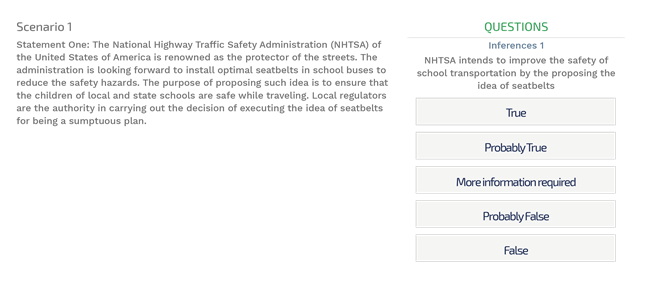At Assessment-Training.com we place the highest value on creating the most representative and best practice tests that the psychometric test industry has to offer. Our tenured department of professional business psychologists who have the perfect mixture of experience, creativity, and a meticulous eye for detail. We have 1000s of quality exercises to wrap your brain around. The 197 tests and 3146 tests can be found in our all-test package.
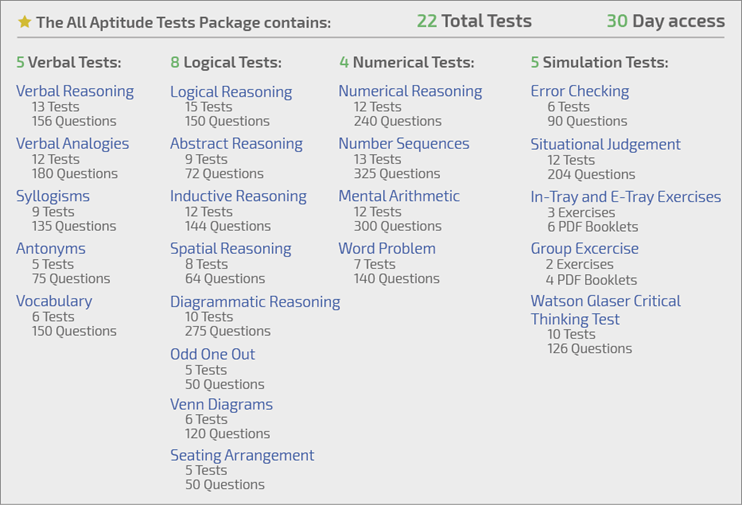
Verbal Tests
1. Verbal Reasoning tests provide information about your general verbal aptitude and verbal intelligence. These tests are designed to assess your ability to verbally understand and use your verbal rationality through analyzing concepts and statements stated in short and context-rich paragraphs. The verbal reasoning test boils down to reading comprehension. Our Verbal Reasoning Test Package consists of 13 tests and 156 questions! Try our Free Verbal Reasoning Practice Test by clicking on the link or image below with 10 questions and worked solutions to see how you measure up against your peers!
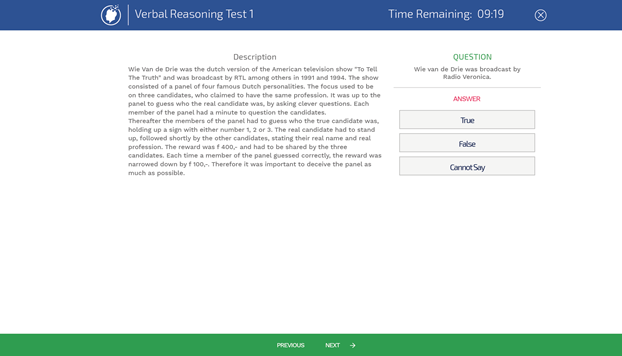
2. Verbal Analogies are a type of basic word problems comprised of two different pairs of words. One of the word pairs that are related to each other in some shape or form is revealed while for the other word pair only one of the two words is revealed and it is up to the candidate to find the correct related word out of a set of multiple-choice answers that fits in the context given.
Our Verbal Analogies Test Package consists of 12 tests and 180 questions. For a brain teaser, try our completely free verbal analogies practice test with 10 questions! Click on the link or image below to open up a new tab.

3. Syllogisms can be defined as a form of reasoning where a specific conclusion is reached by examining several ideas and premises. The word Syllogism originates from the Greek word “syllogismos”, meaning to infer. With syllogisms, common threads between ideas are presented to the candidates, which they should untangle to find out which threads lead to valid conclusions. Our Syllogism Test Package consists of 9 Tests and 135 questions. Try our Free Syllogism Test now! 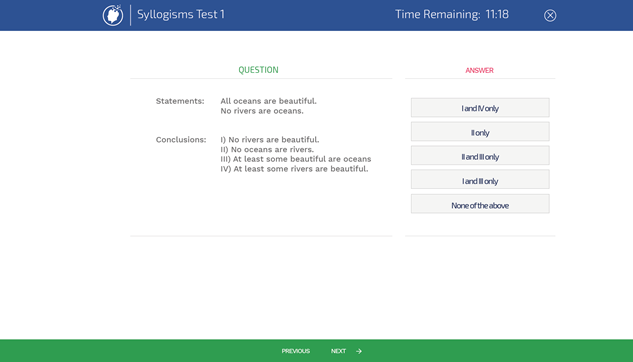
4. Antonyms are words that have a contrary meaning to one another. For instance, buy is an antonym of sell, and happy is an antonym of sad. In an Antonyms Test, candidates have to choose the correct opposite word (antonym) from a list of possible multiple-choice answers. Questions of antonyms consist of a stem word and the candidates are expected to choose the word that is the farthest away in meaning to the given word. You don’t have to find a perfect opposite for the given stem word but choose the most fitting opposite from the given set op answer possibilities. Our Antonyms Test Package consists of 5 Tests and 75 questions. Try our Free Antonyms Test now!
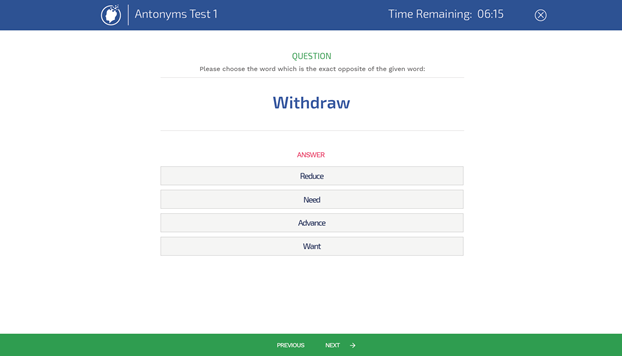
5. Vocabulary Tests are standardized psychometric assessment tests that provide the employing organization with information about a candidate’s general vocabulary size. Try our free vocabulary practice test!
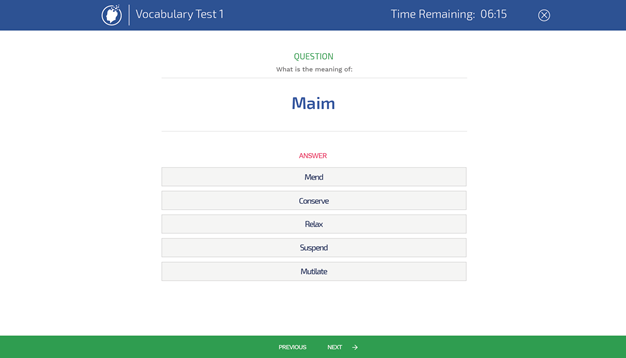
Logical Tests
6. Logical Reasoning Tests assess your ability to rapidly formulate a variety of inferences while at the same time making proper use of deduction to figure out which line of reasoning is illogical and must be crossed out, and which line of reasoning is logical and may require further investigation to arrive at the right conclusion. Premises and the inter-relationships between these unique premises are rigorously put to the test in order to infer conclusions that are implied by synthesizing the premises and relationships. Try our Free Logical Reasoning Test!
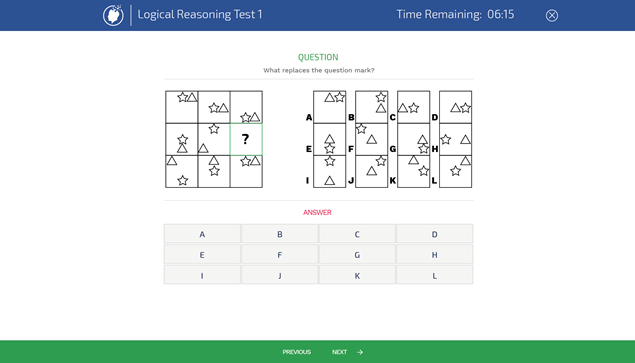
7. Abstract Reasoning Tests are an integral part of any psychometric test and consist of non-verbal questions that depict a multitude of potentially related visual images, shapes, and concepts. Proficiency with these tests is based on the capacity to analyze non-verbal visual information and uncover and reconfigure patterns to formulate logical inferences that can be tested. Try your best at our Free Abstract Reasoning Test!

8. Inductive Reasoning Tests or commonly referred to as bottom-up logic tests assess the candidate by presenting proposed premises and assumptions that imply some evidence towards the acceptance of a truism or conclusion but necessitate further careful investigation for the acceptance or rejection of that conclusion. The candidate is presented with a set of graphical representations that follow an implied and specific pattern that is intended to be hidden to a certain degree. Only through keen observation and exploration of related concepts and ideas, the correct line of reasoning that solves the question may be brought to your attention. Go ahead and take our Free Inductive Reasoning Practice Test!
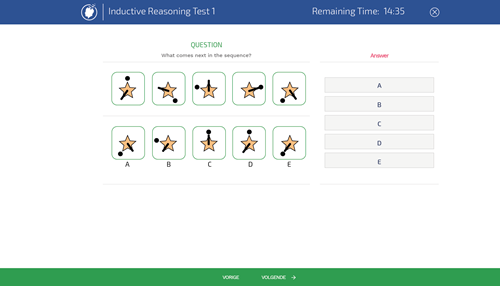
9. Spatial Reasoning Tests are non-verbal, psychometric assessment tests that provide information about a candidate’s ability to mentally re-arrange, rotate and manipulate shapes or objects without physically touching them. Spatial Reasoning is essential for solving common problems, such as using a map and compass, merging into high-speed traffic, and orienting yourself in your environment. Other examples of tasks that require visual-spatial ability are determining the size of a box and how many objects fit in it, and using mirror images. Try our Free Spatial Reasoning Practice Test!
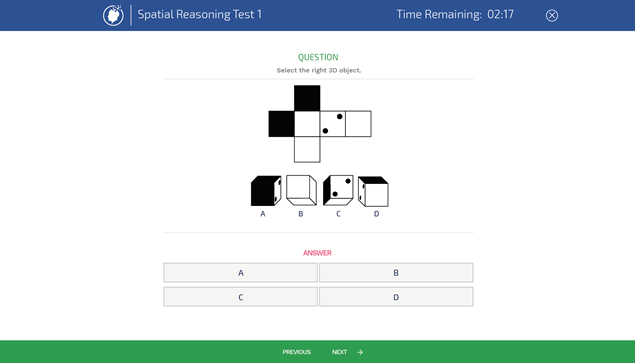
10. Diagrammatic Reasoning Tests assess a candidate’s general ability to extract concepts or rules from apparently unrelated visual information. In essence, Diagrammatic Reasoning Tests display a series of operators and their outputs. It is the candidate’s task to infer a set of rules and to apply them to new situations. Candidates will not be required to use any prior knowledge, and the questions on the actual test will not vary depending on the role or specific industry where the candidate is recruited for. Try our Free Diagrammatic Reasoning Practice Test!
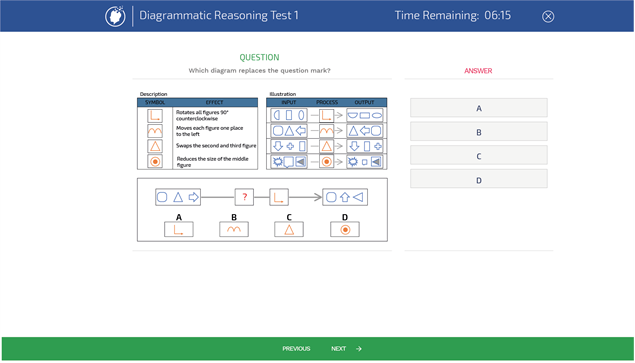
11. Odd One Out Tests
assess your capacity to differentiate between and derive patterns from a combination and multitude of different objects, shapes, lines, sizes, numbers, and shadings. The meaning of the odd-one-out test is to determine which figure is the most different from the rest and does not follow a logical pattern like is the case with the other figures. Take a crack at our Free Odd-One-Out Practice Test!
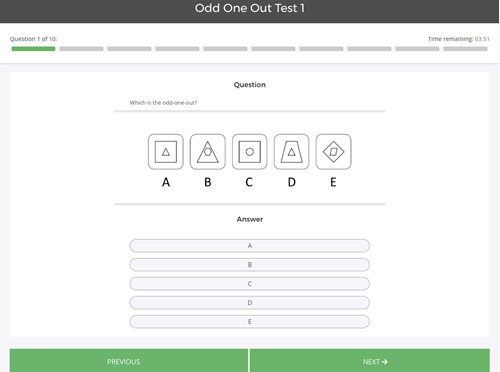
12. Venn Diagrams Tests (also called primary diagram, set diagram, or logic diagram) are diagrams that show all possible logical relations between a finite collection of different sets. In a Venn Diagram Test, the candidate is given three elements. These elements may or may not have some inter-linkage or relationship. It is up to the candidate to select the answer that correctly visualizes the relationship between the given elements. Give our Free Venn Diagrams Practice Test a shot!

13. Seating Arrangement Tests require the candidate to arrange people, animals, objects, and items in a specific way according to a number of "accepted premises and assumptions" regarding their relative placements and positioning. With seating arrangement questions, you will also frequently have to arrange things in a competitive (race) context. Think of situations where people are ranked from first to last, best performing to least performing, fastest to slowest and you will most likely find it in a Seating Arrangement Test. Try your best at our Free Seating Arrangement Practice Test.
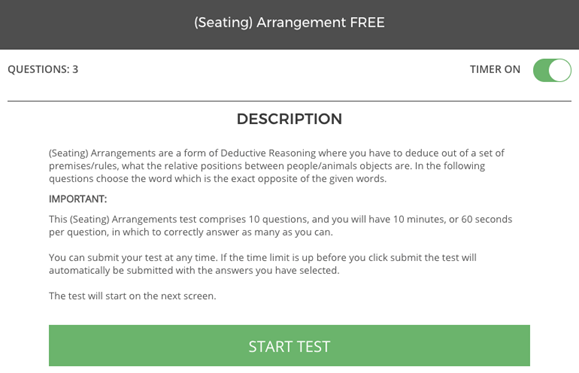
Numerical Tests
14. Numerical reasoning aptitude assessments are developed to measure a candidate’s numerical skills based on number operations, ranging from basic mental arithmetic to an advanced level of critical thinking and logical reasoning. Numerical Reasoning is a professionally sought-after hard skill that should not be underestimated as it knows many uses. Numerical reasoning tests can be referred to as “number-savvy”, and are often framed as “speed tests” because they have stringent time constraints. These tests are equipped to assess basic numerical ability and generally do not allow the use of calculators. Give our Free Numerical Reasoning Practice Test a go!
15. Number Sequences Tests or also commonly referred to as number series tests, require you to find the missing number in a given sequence. This initial sequence has a defined pattern and you are to determine this pattern and thereby find the missing number. Several different patterns are used in number sequence tests. You are to determine which pattern applies and select the right answer. Give our Free Number Sequences Practice Test a shot!
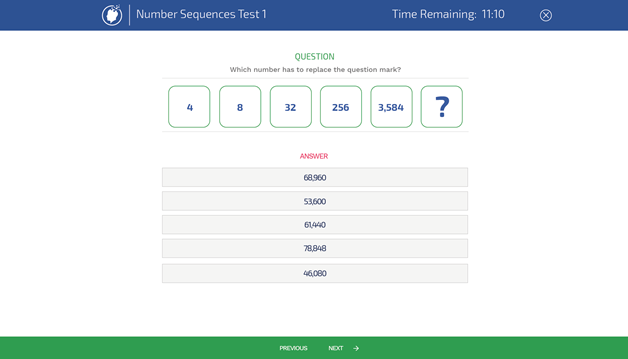
16. Mental Arithmetic Test are equipped to assess a candidate's basic numeracy skills and can be categorized as a speed test. Candidates will be presented with mathematical questions that show equations that include basic addition, subtraction, multiplication, division, fractions, and percentages. To see where your arithmetic skills stand, try your best at our Free Number Sequences Practice Test.
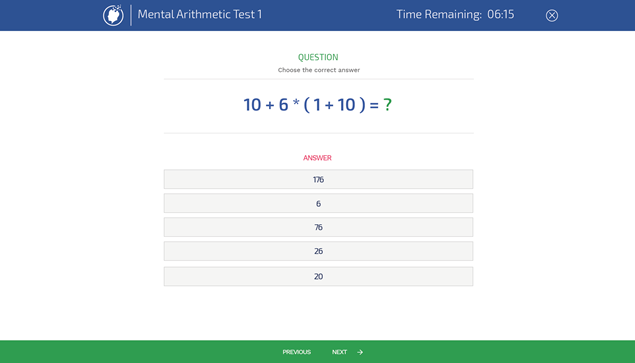
17. Math Word Problem Tests provide the employing organization with information about a candidate’s general reading comprehension skills, ability to visualize information, and numerical aptitude. Candidates are required to answer the math word problems using the mathematical underlying facts presented in the form of a short text or passage. Here is a Free Math Word Problem Practice Test to try your best at!
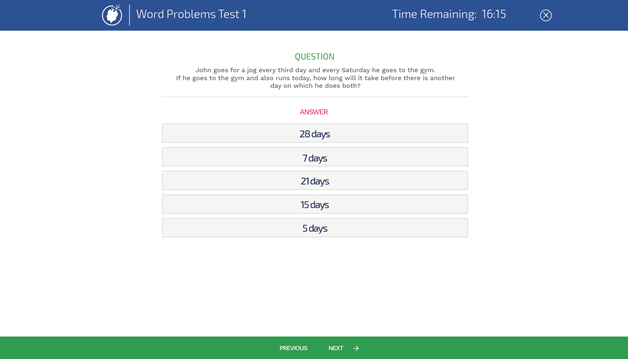
Simulation Tests
18. Error Checking Tests are designed to measure attention to detail and evaluate speed and accuracy skills. Error checking tests demand a high level of concentration due to the fact that they require the discrimination and comparison of sets of data that contain a lot of numerical and letter-based information. Check out our Free Error Checking Practice Test!
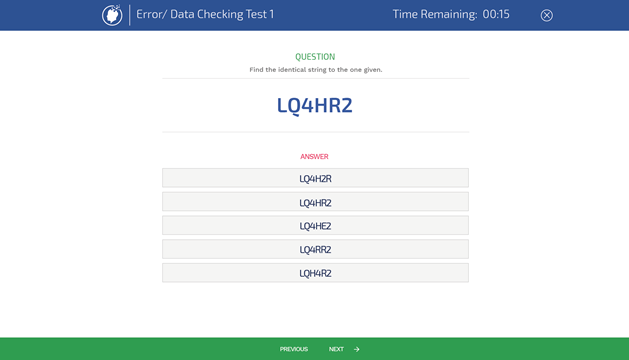
19. Situational Judgment tests measure your general ability to choose the most appropriate action in typical workplace situations. These tests are designed to assess your ability to handle simulated work situations and tackle problems that you could encounter during your work experience. Situational Judgment Tests operate with four distinguishable answering templates namely: most/least likely to perform, ranked responses, rated responses, most/least effective responses. Try our Free Situational Judgement Practice Test!
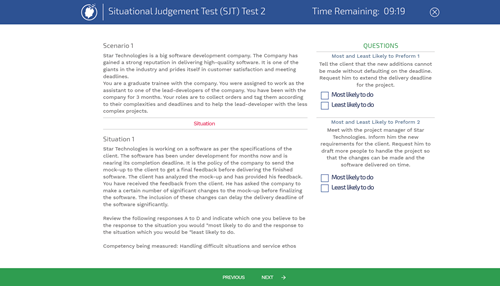
20. In-Tray and E-Tray Exercises require candidates to prioritize their tasks based on simulated work scenarios. You will be given a selection of letters, emails, and reports in either paper or electronic format, which someone might find in their email inbox. The test will probably start with information describing the background scenario. The background information included company information, policy documents, organization charts, letters of complaint, and role specifics. The subject matter is usually related to the job you're applying for. You must go through emails and memos, return phone calls and manage situations and tasks. These tasks include ranking the given information in order of urgency. In some tests, you have to explain why you took certain decisions and describe the actions you would take.
21. Group Exercise Tests simulate an assessed discussion exercise that involves a small group of candidates (usually 8 – 16 people), following a work-place related problem, or scenario requiring the entire team to work together and solve this issue. These types of tests are designed to test your ability to work with other people efficiently. Group exercises are very similar in nature to a panel interview. Typical factors assessed in a group exercise include your values, team working ability, leadership potential and influence, social skills, and interpersonal skills. The most important success factor for any group exercise or discussion is active participation.
22. Watson Glaser Critical Thinking Tests are composed of a set of five tests. Each test is designed to address a different aspect of critical thinking and they are inferences, recognition of assumptions, deductions, interpretations, and evaluation of arguments. The test assesses your ability to engage in critical thinking, your comprehension of necessary evidence before drawing conclusions, the capacity to differentiate between inferences, abstractions, and generalizations through the application of logic, and the capacity to combine the abovementioned skills for decision-making. Put your Critical thinking skills to the test with our Free Watson Glaser Critical Thinking Test!
